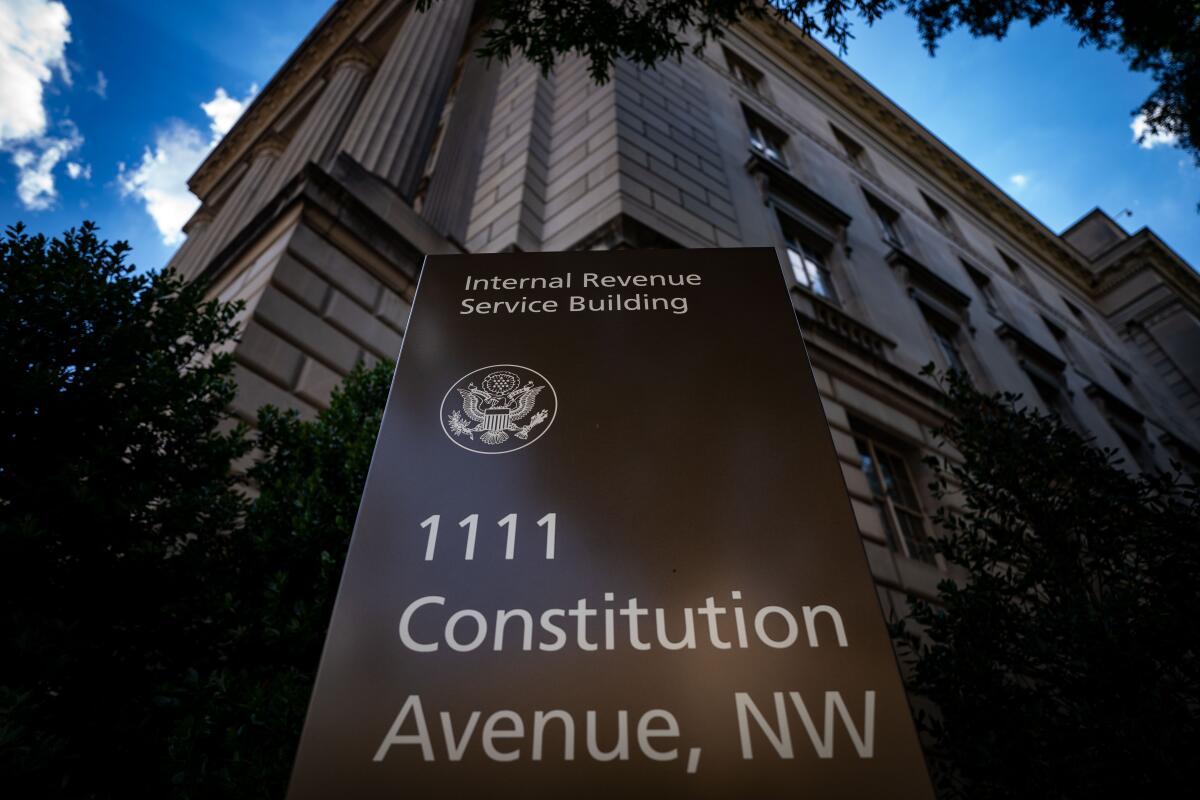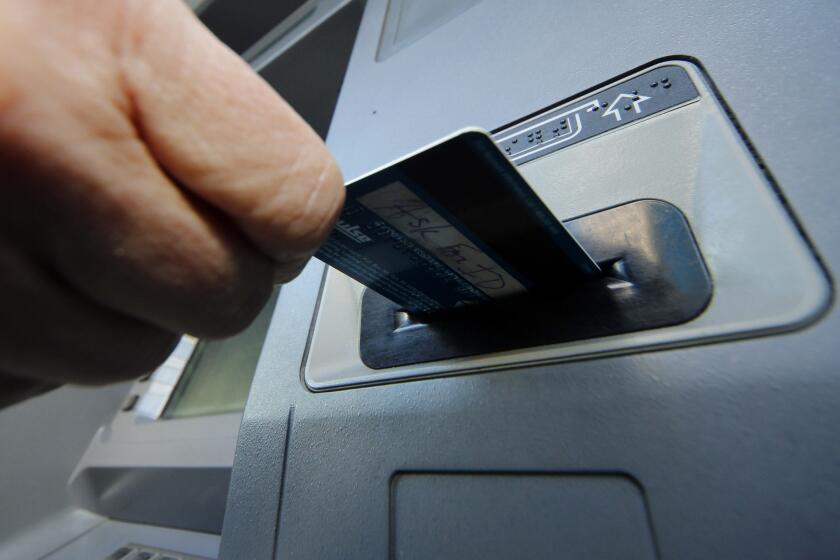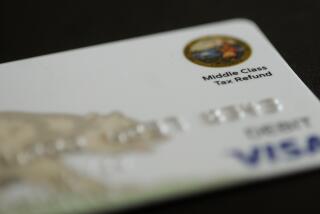IRS says it won’t tax California’s Middle Class Tax Refund

- Share via
Relax, Californians — the Middle Class Tax Refund you received last year will not be subject to federal taxes.
The Internal Revenue Service issued long-awaited guidance Friday afternoon, saying it “determined it will not challenge the taxability of payments related to general welfare and disaster relief.” California’s Middle Class Tax Refund falls into that category, the agency said, as do the payments in 16 other states.
According to the IRS, you won’t need to report the payment as income on your 2022 return. So recipients can ignore the federal 1099-MISC form sent out last month by the state Franchise Tax Board.
Accountants across California had been grumbling for weeks about the IRS’ refusal to clarify the issue. And on Thursday, the IRS’ in-house taxpayer advocate service added its voice in a blog post.
“Giving taxpayers a choice between waiting to file their returns and receive their refunds or filing returns now that the IRS may later determine to be inaccurate is not acceptable,” the National Taxpayer Advocate said. The advocate is an independent division within the IRS that helps taxpayers resolve problems with the agency.
“This was a known issue, with ramifications for tens of millions of taxpayers, tax return preparers (who still prepare most federal income tax returns) and tax software developers. The failure to have identified and resolved this issue before the filing season suggests that someone, or everyone, was asleep at the switch.”
One silver lining for rain-soaked Californians is that the IRS is giving many of them an extra month to file their 2022 tax returns.
Although the IRS has published several forests’ worth of guides on the intricacies of the federal tax code, it hesitated to clarify how California households should treat the $200 to $1,050 they received from the state’s Middle Class Tax Refund. The confusion stemmed from the fact that the payments were not actually tax refunds but were just (for lack of a better term) handouts. Were they tax refunds, they would be considered taxable income by the feds only for recipients who itemize their deductions and write off their state taxes.
And while the payments were funded with federal COVID-19 relief dollars, they were not explicitly aimed at helping people affected by the pandemic — a designation that would have exempted them from federal taxation. Instead, California billed the money as relief from the state’s high gasoline prices.
Last week, the IRS urged taxpayers who were uncertain about how to treat these payments to hold off filing their federal returns, promising to offer clarity to at least some taxpayers this week.
Matthew Frankel, a certified financial planner and contributor to the Motley Fool financial website, said the 17 states that issued some type of rebate last year typically used federal COVID relief money to pay for them. The stated goal of the aid, however, usually was to help households cope with inflation, Frankel said.
These sorts of rebates should be exempt from federal taxes, he said, because they fall under “general welfare exclusion.” That category covers payments a state makes to benefit the public at large, such as the checks California sent to low- and moderate-income households in 2021 as part of the Golden State Stimulus program.
In Friday’s guidance, the IRS said that determining whether a payment fit into the tax-exempt categories of general welfare or disaster relief was “a complex fact intensive inquiry that depends on a number of considerations.”
Given both the nature of the payments and taxpayers’ need for “certainty and clarity,” the IRS said it “will not challenge the treatment of the 2022 payment as excludable for income on an original or amended return.” One reason, it said, was “the fact that the pandemic emergency declaration is ending in May, 2023 making this an issue only for the 2022 tax year.”
Most Californians received their Middle Class Tax Refund in 2022, but some payments went out this year.
A prepaid Middle Class Tax Refund card was meant to ease gas prices. But Californians are reporting that thieves are taking all or part of the money.
The state Franchise Tax Board has said California won’t tax the payments. It offered no guidance on whether the money would be subject to federal taxes.
H&R Block didn’t wait for the IRS to get off the fence, Frankel said; the service has been treating the Middle Class Tax Refund as exempt from federal taxes and not waiting to file returns. Similarly, he said, Intuit’s TurboTax software is treating the payments as tax exempt.
Tax professionals say that Californians should file their returns as soon as they can. That’s because about 75% of households are due a refund — the average was a little more than $3,000 last year — and the longer they wait to claim it, the longer they’re lending money to the feds interest-free. Worse, some tax pros warn, the later you file, the greater the risk that a fraudster will use your stolen Social Security number to try to claim your refund before you do.
About The Times Utility Journalism Team
This article is from The Times’ Utility Journalism Team. Our mission is to be essential to the lives of Southern Californians by publishing information that solves problems, answers questions and helps with decision making. We serve audiences in and around Los Angeles — including current Times subscribers and diverse communities that haven’t historically had their needs met by our coverage.
How can we be useful to you and your community? Email utility (at) latimes.com or one of our journalists: Jon Healey, Ada Tseng, Jessica Roy and Karen Garcia.
More to Read
Sign up for Essential California
The most important California stories and recommendations in your inbox every morning.
You may occasionally receive promotional content from the Los Angeles Times.













